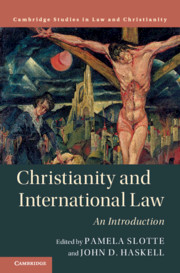Book contents
- Christianity and International Law
- Law and Christianity
- Christianity and International Law
- Copyright page
- Dedication
- Contents
- Tables
- Contributors
- Acknowledgments
- 1 Christianity and International Law: An Introduction
- 2 The Byzantine Commonwealth and the Emerging Features of a Law of Nations in the First Millennium
- 3 Christianity and the Birth of Ambassadorial Deontology: Some Historical Notes
- 4 Formation and Refiguration of the Canon Law on Trade with Infidels (c.1200–c.1600)
- 5 God, Sovereignty, and the Morality of Intervention outside Europe
- 6 The Significance of Christian Charity to International Law
- 7 Hugo Grotius: On Freedom of the Seas and Human Nature
- 8 Ius gentium et naturae: The Human Conscience and Early Modern International Law
- 9 Legalizing Antisemitism? The Legacy of Savigny’s Roman(tic) Law
- 10 Missionary Knowledge and the Empirical Foundations of Modern International Legal Thought
- 11 Standards for a Righteous and Civilized World: Religion and America’s Emergence as a Global Power
- 12 International Protestantism and Its Changing Religious Freedoms
- 13 Beyond the Freedom of Worship: The Contested Meaning of Religious Freedom in International Human Rights Law and Politics, 1945–1967
- 14 Process Theology and a Pluralistic Foundation for Human Rights
- 15 Christianity and Human Rights Law: Orthodox Perspectives
- 16 Conquest, Sacred Sites, and “Religion” in a Time of Crisis
- 17 Constantine’s Legacy: Preserving Empire While Undermining International Law
- 18 Hopelessly Practicing Law: Asylum Seekers, Advocates, and Hostile Jurisdictions
- 19 The Hidden Theology of International Legal Positivism
- Select Bibliography
- Index
- References
8 - Ius gentium et naturae: The Human Conscience and Early Modern International Law
Published online by Cambridge University Press: 17 May 2021
- Christianity and International Law
- Law and Christianity
- Christianity and International Law
- Copyright page
- Dedication
- Contents
- Tables
- Contributors
- Acknowledgments
- 1 Christianity and International Law: An Introduction
- 2 The Byzantine Commonwealth and the Emerging Features of a Law of Nations in the First Millennium
- 3 Christianity and the Birth of Ambassadorial Deontology: Some Historical Notes
- 4 Formation and Refiguration of the Canon Law on Trade with Infidels (c.1200–c.1600)
- 5 God, Sovereignty, and the Morality of Intervention outside Europe
- 6 The Significance of Christian Charity to International Law
- 7 Hugo Grotius: On Freedom of the Seas and Human Nature
- 8 Ius gentium et naturae: The Human Conscience and Early Modern International Law
- 9 Legalizing Antisemitism? The Legacy of Savigny’s Roman(tic) Law
- 10 Missionary Knowledge and the Empirical Foundations of Modern International Legal Thought
- 11 Standards for a Righteous and Civilized World: Religion and America’s Emergence as a Global Power
- 12 International Protestantism and Its Changing Religious Freedoms
- 13 Beyond the Freedom of Worship: The Contested Meaning of Religious Freedom in International Human Rights Law and Politics, 1945–1967
- 14 Process Theology and a Pluralistic Foundation for Human Rights
- 15 Christianity and Human Rights Law: Orthodox Perspectives
- 16 Conquest, Sacred Sites, and “Religion” in a Time of Crisis
- 17 Constantine’s Legacy: Preserving Empire While Undermining International Law
- 18 Hopelessly Practicing Law: Asylum Seekers, Advocates, and Hostile Jurisdictions
- 19 The Hidden Theology of International Legal Positivism
- Select Bibliography
- Index
- References
Summary
What to focus on in an intellectual history of ius gentium et naturae for a volume on the relations between international law and Christianities? For centuries, (international) law and Christian theology maintained intensive and complex relations, which it is impossible to do justice to within the scope of this chapter. With the more recent “turn to history” in international legal scholarship, discussions of the relationship between ius gentium et naturae and Christianity generally center on secularization and/or empire. For obvious reasons both sets of histories deal with early modernity – the time that the so-called Respublica Christiana or Holy Roman Empire was profoundly affected by Reformations, gradually fragmented, and religious and theological fights were part of the politics of the newly emerging European nation-states.
Keywords
- Type
- Chapter
- Information
- Christianity and International LawAn Introduction, pp. 153 - 176Publisher: Cambridge University PressPrint publication year: 2021

